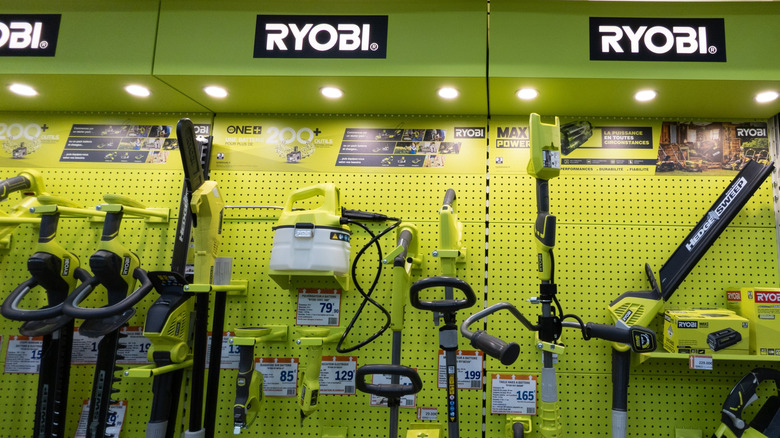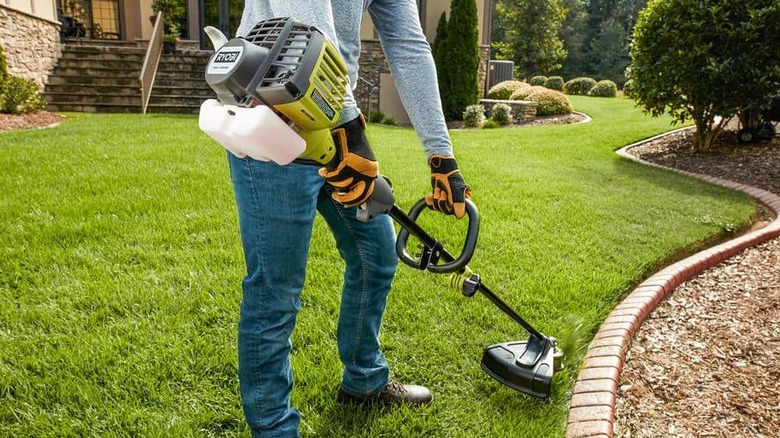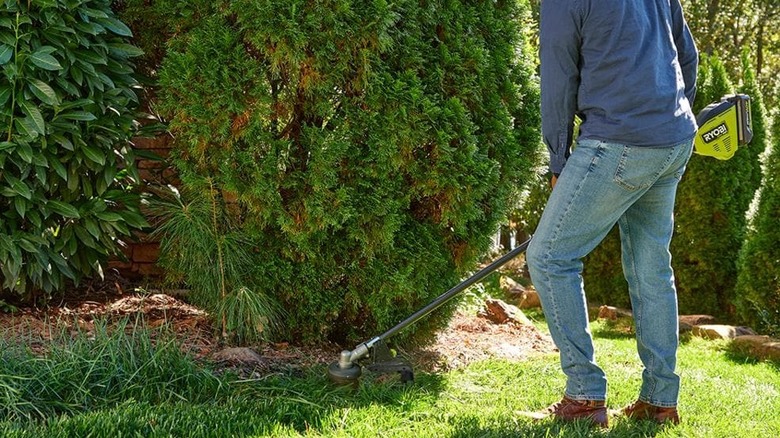How To Choose Between Ryobi's Gas And Electric Grass Trimmers
We may receive a commission on purchases made from links.
Making the choice between Ryobi's gas and electric grass trimmers comes down to your specific lawn needs. Gas models, like Ryobi's 2-cycle and 4-cycle options, deliver solid performance while tackling thick weeds and larger properties. Electric trimmers, available in corded or battery-powered versions, offer a lighter-weight option that requires a bit less maintenance. Your decision should be based on yard size, landscape needs, and how often you'll need to use it.
For larger yards, a half acre or more, with dense overgrown areas, gas trimmers might be the best option. They provide higher torque to power through tougher jobs without frequent refueling. Electric models, on the other hand, do much better in smaller suburban lawns where less noise and easier storage matter more. Ryobi's 40V battery-powered lineup is a good in-between; you'll get cordless freedom with enough juice to deal with most medium-sized lawns. You should also consider your personal comfort. Electric trimmers are lighter and can reduce fatigue during extended use, while gas ones tend to be heavier and require more effort to maneuver. There is a viral wheel attachment for your string trimmer that can help alleviate some of that heft, though.
When a Ryobi gas trimmer is worth it
Ryobi's gas-powered trimmers, like the RY34540 4-Cycle model, offer great cutting power, making them a perfect choice for tall grass and weeds. Unlike electric versions, they don't rely on battery life or long extension cords. No need for constant battery changes or re-adjusting wires when you have a big job that needs to be tackled. The 4-cycle engines also eliminate the need for mixing oil and gas, making maintenance even easier when compared to traditional 2-cycle ones.
There are, of course, downsides to a gas trimmer. They are much louder, which can disturb neighbors and may require some ear protection when working. Emissions are another concern, even with the cleaner 4-cycle engines, they are less eco-friendly than electric ones. Maintenance is a bit more involved as well, requiring regular air filter changes, spark plug checks, and it can be a major problem to change the pull string on some Ryobi models. Fuel will also add up over time, so make sure to account for continued costs when shopping for a trimmer.
Why Ryobi's electric trimmers win for everyday use
Ryobi's electric trimmers, specifically the 40V battery-powered models, eliminate the fumes, noise, and maintenance headaches of gas while delivering enough power for most residential needs. The 18V lineup is great for smaller yards, while the 40V options can rival gas performance. The instant start-up and quieter operation make them perfect for early morning work or noise-sensitive areas. You'll even be able to save money on batteries by sticking with Ryobi's 40V power system for other tools in your garage.
The downsides come in runtime and power. Even with spare batteries, electric trimmers just don't have the lasting power to outmatch gas for longer workloads. If you've got particularly thick weeds, it may require multiple passes, which only increases the time spent working. Corded models offer unlimited runtime, but you sacrifice mobility. That said, there have been many advancements in brushless motor tech that help narrow the power gap. Ryobi's 40V Expand-it trimmer, despite its pros and cons, claims a full hour runtime when paired with a 40V 4Ah battery, and even more with an 8Ah one. Ultimately, for homeowners with a small to mid-sized lawn, electric trimmers are a great choice. They store easily, require no fuel, and start almost instantly. Just make sure you keep some spare batteries and clean the head regularly to prevent buildup.


